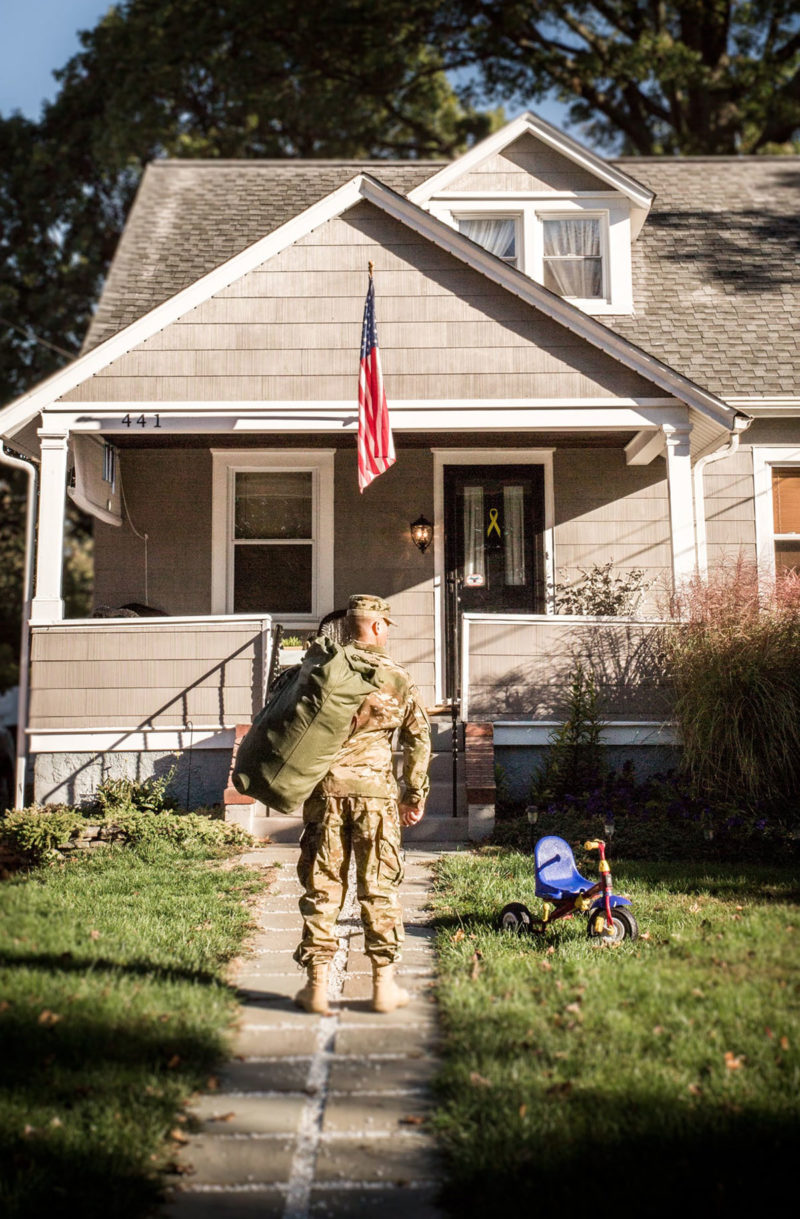Time for Focused Determination
Week Summary
Finish this sentence: With God’s help I determine to_____________________________.
Determination dominated Nehemiah’s life, and he gave the credit to God. God was the one who stirred the hearts of the people to work, to persevere, and finally to prosper. Discover how God’s power is working in your life to help you persevere and remain dedicated to finding a new normal after deployment.
About This Journey
Reintegration is hard: it messes with rhythms and feels uncomfortable. “Reunited and Resilient” tells the story of how God stirred a king to change the trajectory of a nation. Follow along as God shows us how He can also stir your family’s hearts to reach for restoration as you journey toward reintegration following deployment.
This Week's Readings
Fighting Words
Read
Now when Sanballat heard that we were building the wall, he was angry and greatly enraged, and he jeered at the Jews. And he said in the presence of his brothers and of the army of Samaria, “What are these feeble Jews doing? Will they restore it for themselves? Will they sacrifice? Will they finish up in a day? Will they revive the stones out of the heaps of rubbish, and burned ones at that?” Tobiah the Ammonite was beside him, and he said, “Yes, what they are building— if a fox goes up on it he will break down their stone wall!” Hear, O our God, for we are despised. Turn back their taunt on their own heads and give them up to be plundered in a land where they are captives.
-Nehemiah 4:1-4So we built the wall. And all the wall was joined together to half its height, for the people had a mind to work.
-Nehemiah 4:6Reflect
Fighting words. You know them. Someone from outside or inside your walls speak them, and they sting. Fighting words can come in the form of nagging, blaming, criticizing, or venting. Whether you return the punch with your own words or shrink in silent hurt, fighting words are daggers to the soul. Without striking a blow, a word can bring defeat, wreak havoc, and do damage.
The returning exiles were rebuilding. Not happy about the progress, enemies hurled fighting words at Nehemiah and the wall-builders. Naysayers surrounded them, ready to attack. What an intense moment! Outside, enraged enemies; inside, builders frightened by a continual bombardment of propaganda. Would the discouraging words stop the rebuilding effort?
The Israelites organized their army around families. Each family stationed themselves to work, and in this case fight, together. Nehemiah began to muster their courage. He did this out in the open so the enemy could hear and see the preparation for what could have been a minor war.
Can you relate to this war of nerves? You may be making progress in rebuilding your relationship following deployment, and then something discouraging is said, from inside or outside your family walls. Voices whisper, “Too much has changed and your family will never recover.” Do not believe the naysayers. Will it take work? Yes! The fact that the words “work” and “fight” are included in this rebuilding scene implies that progress did not come easy. But with God’s help, and the will of the families to do the hard work, they made progress—and so can you.
Take heart! Like these builders, muster your family, look to the Lord, ask for his help, and have a mind to work! Even when you are discouraged, don’t stop. Look at what you have accomplished, not just what needs to be done. You too can report: “We kept at it, repairing and rebuilding the wall. The whole wall was soon joined together and halfway to its intended height because [our family] had a heart for the work” (Nehemiah 4:6 MSG).
Respond
Have you heard discouraging words from without or within your family concerning redeployment? What strategy can you adopt to fight them from the example in Nehemiah 4?
Prayer
Father, give my family and me a heart to do the work of rebuilding anything damaged or broken. Help us not to become discouraged, but to keep working together to become the family you have designed. Amen.
Multitasking
Read
From that day on, half of my servants worked on construction, and half held the spears, shields, bows, and coats of mail. And the leaders stood behind the whole house of Judah, who were building on the wall. Those who carried burdens were loaded in such a way that each labored on the work with one hand and held his weapon with the other.
-Nehemiah 4:16-17And I said to the nobles and to the officials and to the rest of the people, “The work is great and widely spread, and we are separated on the wall, far from one another. In the place where you hear the sound of the trumpet, rally to us there. Our God will fight for us.”
-Nehemiah 4:19-20Reflect
How are you at multitasking? I do not mean eating breakfast and thinking about lunch simultaneously—I have that down to a fine art. Multitasking is the ability to handle more than one task at a time. As much as we value and try to improve our multitasking ability, research reports that it is not good for our bodies or our minds. Yet we continue to challenge the naysayers, and some of us are even successful at holding a sleeping baby with one hand while quietly emptying the dishwasher with the other.
Research does, however, provide strong proof that multitasking can wear you out physically and emotionally. In other words, beware of trying to do too much. Be especially vigilant during the reintegration process. As you focus on rebuilding routine and ritual back into your family, watch for threats like exhaustion and irritability from trying to do it all at one time.
Nehemiah’s team of builders put new meaning to multitasking as they worked with one hand with weapons in the other. Their challenge was not only multitasking, but feeling isolated. Each family was responsible for a section of the wall with broad space between each section. It was easy to feel cut off and secluded, to believe the threat of enemy attack was ever-present. To combat the intimidation of “what ifs” Nehemiah established a warning system. The people were to rally to the sound of the trumpet. The builders left no one alone and in danger of ambush.
My friend, you may think you are the only one rebuilding a routine or a relationship while also doing all the other things life demands. But like the Jewish families rebuilding a portion of the city wall, many families in your military community are rebuilding from deployment alongside you.
Sometimes, multitasking is unavoidable. Nehemiah’s wall-builders had no choice but to hold a sword in one hand and lay stones with the other. However, they only did this for fifty-two days—until the wall was complete. The days after redeployment may require family multitasking. If all goes well, and with God’s help, your family can quickly recover from deployment and shift focus to other family concerns.
Respond
What can you learn from Nehemiah’s strategy for completing God’s work in Nehemiah 4:9, 14, and 20? In what ways does your family multitask?
Prayer
Lord, grant me wisdom and courage to face the tasks set before me. When I am weary, remind me: “The eyes of the LORD search the whole earth in order to strengthen those whose hearts are fully committed to him” (2 Chronicles 16:9a NLT). Amen.
Hang On
Read
I also persevered in the work on this wall, and we acquired no land, and all my servants were gathered there for the work.
-Nehemiah 5:16Reflect
On an empty corner by my house stands a lone tree. For the past year, this tree and what it holds have been a source of encouragement and motivation. Last Christmas some creative soul decorated the tree, brightening an otherwise drab community space. But then the decorations were left to the elements. Month after month, I watched them slowly disappear—except for one lone bulb. For well over a year, that little orb has held on to a branch. Last winter, my area of the country saw its share of wind, rain, and even a hefty deposit of snow. Yet that tiny object holds firm.
I find myself looking for the little sphere of hope as I turn the corner. I anticipate the grief of the day I do not spot it among the branches. There were days I related to it hanging there … alone … exposed … vulnerable … but still hanging on.
I see that same spirit in Nehemiah as he walked out perseverance, sacrifice, and personal integrity in the midst of challenging times. It is the same goal Paul expressed in Colossians 1:9–12. I like the paraphrase from The Message:
… We pray that you’ll have the strength to stick it out over the long haul—not the grim strength of gritting your teeth but the glory-strength God gives. It is strength that endures the unendurable and spills over into joy, thanking the Father who makes us strong enough to take part in everything bright and beautiful that he has for us …
The strength Paul refers to is the supernatural power of God. The word he uses carries the idea of making strong something or someone that is naturally weak (that’s me!)—not a surge of strength but a steady and constant access to Christ, the source of strength. He prayed that we would have strength to stick it out over the long haul—to persevere—to hang in there. He asked the Father to help us remain steadfast under trial without giving in or giving up, no matter the intensity or length of the testing. His prayer covers various trials we may face: sickness, pain, financial loss, death of a loved one, warfare, persecution, marital problems, a wayward child, deployment, reintegration, even a duty station where we just cannot seem to find our place.
Sisters, this is the lesson I learned as I watch the tenacious Christmas bulb: The strength to hang on is not just to hang on. God gives his strength, not just to let us breathe another breath to survive, but to enable us to speak words of hope and encouragement to help others thrive. His strength is not just to help us open our eyes to another dawn, but to help us open our eyes to behold the glory of his majesty all around us. He strengthens us to walk through another day, but that is not where it stops. With God’s help, we can climb over obstacles, run and not grow weary, and “take part in everything bright and beautiful that he has for us.”
Respond
How do you see God’s power working in your life to help you hang on? What step forward might God want you to make today?
Prayer
Lord, thank you for the exchange of your strength for my weakness. Use me to speak words of hope to someone today. Amen.
Learning to Say No
Read
Now when Sanballat and Tobiah and Geshem the Arab and the rest of our enemies heard that I had built the wall and that there was no breach left in it ( although up to that time I had not set up the doors in the gates), 2Sanballat and Geshem sent to me, saying, “Come and let us meet together at Hakkephirim in the plain of Ono.” But they intended to do me harm. 3And I sent messengers to them, saying, “I am doing a great work and I cannot come down. Why should the work stop while I leave it and come down to you?”
-Nehemiah 6:1-3Reflect
Say it with me: “no.” Come on, you can do better: “No.” You are almost there. Say it one more time with conviction: “NO!” That wasn’t so hard, was it? Actually, trust me, I know how hard it can be to say no. Why is that little word such a challenge to get out of a mouth?
In The Best Yes, Lysa TerKeurst writes, “Whenever you say yes to something, there is less of you for something else. Make sure your yes is worth the less.” She encourages her readers to “Find that courageous yes. Fight for that confident no.”
The wall was almost finished. Nehemiah and his team could see the approaching completion of their labor. Then what happened? The enemies of the returning exiles reared their mischievous heads again with an invitation for Nehemiah to meet them. These folks would not take no for an answer. They knew that once Nehemiah finished rebuilding the wall, a political and economic resurgence would occur in the region. They did not want to see a shift in the balance of power that would come with the completed structure. They set out to distract, discredit, and intimidate Nehemiah.
Rebuilding the wall was not something Nehemiah decided to do on a whim. God called him to do the work—a work so significant he could not afford to be distracted. He responded to those who would sidetrack him with a confident “no”: “I am doing a great work and I cannot come down. Why should the work stop while I leave it and come down to you?”
When your husband returns from a deployment—short or long—you may be tempted to say, “Good, you’re home! Now I can _____________.” Oh, but may I issue a caution? Exercise determination to be steadfast in reestablishing your family. Guard against distractions that can keep you from family priorities. Am I encouraging you to say no to everything and only do the family huddle? Of course not, but use wisdom in those things to which you say yes.
Respond
How does 1 Corinthians 15:58 relate to the scene in Nehemiah 6? What can you learn about priorities from Nehemiah’s example?
Prayer
Lord, give me wisdom to discern when to say a confident “no” and the grace to say it with kindness. Guide my family so we do not confuse our priorities. Amen.
Done!
Read
So the wall was finished on the twenty-fifth day of the month Elul, in fifty-two days. And when all our enemies heard of it, all the nations around us were afraid and fell greatly in their own esteem, for they perceived that this work had been accomplished with the help of our God.
-Nehemiah 6:15-16Reflect
Completed. Finished. Done.
Have you ever worked on a project wondering when you would be able to say those words? Whatever the length, a deployment can feel like it will never be completed, finished, done. Reintegration sometimes bring us to the question, “Are we finished yet?”
Nehemiah and his team of builders completed the work in record time—fifty-two days. Notice the perspective of Nehemiah, “… this work had been accomplished with the help of our God.” Nehemiah could not attribute the accomplishment to ordinary human effort. The timeframe was impressive, but the timeframe was not the point. God’s work on behalf of the people was the point. God was the one who stirred the hearts of people to work, to persevere and finally to prosper.
Nehemiah proclaimed that the wall was completed, but he did not mean the work was done. The same goes for family life. Reaching normalcy does not mean you quit. Keep reading in Nehemiah 6 and you will discover that the hostilities toward the returning Jews continued. Rebuilding the wall was not an end in itself, but it was a step toward continued positive reform for the returning nation.
No one has been able to set parameters and time limits for reintegration following deployment. The goal is to get back to a sense of normalcy. It may happen in fifty-two days—or not. The timeframe is not the goal.
Friend, I write these words to encourage you and remind you that we are people in process. We can never say, “We are done,” because we are always facing the next step in the process toward better and stronger. Isn’t that what we want for our relationships—with God, with family members, with ourselves?
Respond
How can you relate this quote from Winston Churchill to your family life following deployment? “I have no fear of the future. Let us go forward into its mysteries, let us tear aside the veils that hid it from our eyes, and let us move onward with confidence and courage.” In what areas is God calling you to move onward with confidence and courage?
Prayer
Father, help me to celebrate any sign of a return to normalcy for my family. Let me never settle for thinking we are “done,” but keep me moving forward to being better and stronger—always with your help. Amen.
Resources & Info
Resources to help you and other military wives in your community.
Are you enjoying these resources?
Sign up now to save your Journey progress and your favorite Segments.
Your download is being prepared.
- Small Group Resource: Deployed 2 - Leader's Guide
- Small Group Resource: Deployed 2 - Participant's Guide



